Related Research Articles

In Greek mythology, Achilles or Achilleus was a hero of the Trojan War, the greatest of all the Greek warriors, and the central character of Homer's Iliad. He was the son of the Nereid Thetis and Peleus, king of Phthia.
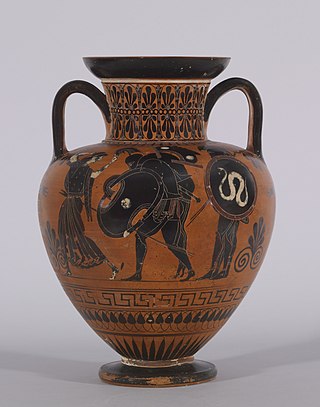
Ajax or Aias is a Greek mythological hero, the son of King Telamon and Periboea, and the half-brother of Teucer. He plays an important role in the Trojan War, and is portrayed as a towering figure and a warrior of great courage in Homer's Iliad and in the Epic Cycle, a series of epic poems about the Trojan War, being second only to Achilles among Greek heroes of the war. He is also referred to as "Telamonian Ajax", "Greater Ajax", or "Ajax the Great", which distinguishes him from Ajax, son of Oileus, also known as Ajax the Lesser.
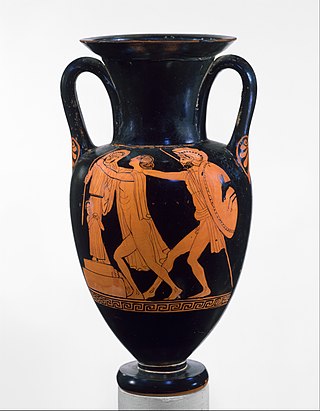
Cassandra or Kassandra in Greek mythology was a Trojan priestess dedicated to the god Apollo and fated by him to utter true prophecies but never to be believed. In modern usage her name is employed as a rhetorical device to indicate a person whose accurate prophecies, generally of impending disaster, are not believed.
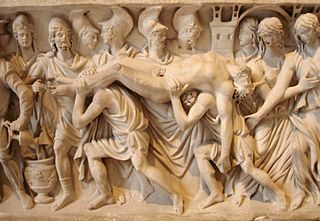
In Greek mythology, Hector is a character in Homer's Iliad. He was a Trojan prince and the greatest warrior for Troy during the Trojan War. Hector led the Trojans and their allies in the defense of Troy, killing countless Greek warriors. He was ultimately killed in single combat by Achilles, who later dragged his dead body around the city of Troy behind his chariot.

In Greek mythology, the Trojan War was waged against the city of Troy by the Achaeans (Greeks) after Paris of Troy took Helen from her husband Menelaus, king of Sparta. The war is one of the most important events in Greek mythology and has been narrated through many works of Greek literature, most notably Homer's Iliad. The core of the Iliad describes a period of four days and two nights in the tenth year of the decade-long siege of Troy; the Odyssey describes the journey home of Odysseus, one of the war's heroes. Other parts of the war are described in a cycle of epic poems, which have survived through fragments. Episodes from the war provided material for Greek tragedy and other works of Greek literature, and for Roman poets including Virgil and Ovid.

In Greek mythology, Teucer, also Teucrus, Teucros or Teucris, was the son of King Telamon of Salamis Island and his second wife Hesione, daughter of King Laomedon of Troy. He fought alongside his half-brother, Ajax, in the Trojan War and is the legendary founder of the city of Salamis on Cyprus. Through his mother, Teucer was the nephew of King Priam of Troy and the cousin of Hector and Paris—all of whom he fought against in the Trojan War.
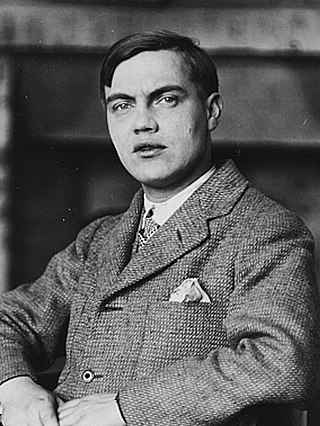
George Johann Carl Antheil was an American avant-garde composer, pianist, author, and inventor whose modernist musical compositions explored the modern sounds – musical, industrial, and mechanical – of the early 20th century. Spending much of the 1920s in Europe, Antheil returned to the United States in the 1930s, and thereafter spent much of his time composing music for films, and eventually, television. As a result of this work, his style became more tonal. A man of diverse interests and talents, Antheil was constantly reinventing himself. He wrote magazine articles, an autobiography, a mystery novel, and newspaper and music columns.

Troy is a 2004 American epic historical war film directed by Wolfgang Petersen and written by David Benioff. Produced by units in Malta, Mexico and Britain's Shepperton Studios, the film features an ensemble cast led by Brad Pitt, Eric Bana, and Orlando Bloom. It is loosely based on Homer's Iliad in its narration of the entire story of the decade-long Trojan War—condensed into little more than a couple of weeks, rather than just the quarrel between Achilles and Agamemnon in the ninth year. Achilles leads his Myrmidons along with the rest of the Greek army invading the historical city of Troy, defended by Hector's Trojan army. The end of the film is not taken from the Iliad, but rather from Quintus Smyrnaeus's Posthomerica as the Iliad concludes with Hector's death and funeral.

The Private Life of Helen of Troy is a 1927 American silent film about Helen of Troy based on the 1925 novel of the same name by John Erskine, and adapted to screen by Gerald Duffy. The film was directed by Alexander Korda and starred María Corda as Helen, Lewis Stone as Menelaus, and Ricardo Cortez as Paris.

Ballet Mécanique (1923–24) is a Dadaist post-Cubist art film conceived, written, and co-directed by the artist Fernand Léger in collaboration with the filmmaker Dudley Murphy. It has a musical score by the American composer George Antheil. However, the film premiered in a silent version on 24 September 1924 at the Internationale Ausstellung neuer Theatertechnik in Vienna presented by Frederick Kiesler. It is considered one of the masterpieces of early experimental filmmaking.
King Priam is an opera by Michael Tippett, to his own libretto. The story is based on Homer's Iliad, except the birth and childhood of Paris, which are taken from the Fabulae of Hyginus.
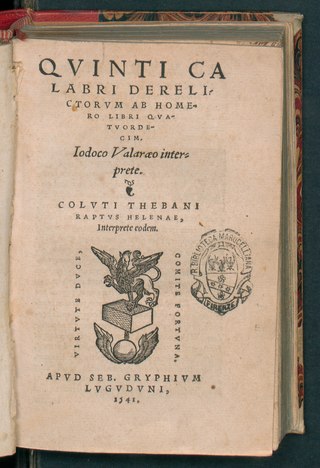
The Posthomerica is an epic poem in Greek hexameter verse by Quintus of Smyrna. Probably written in the 3rd century AD, it tells the story of the Trojan War, between the death of Hector and the fall of Ilium.
Helen Retires is the second opera by George Antheil. The libretto was written by John Erskine based on his novel The Private Life of Helen of Troy (1925). It was written in 1931 but not performed until 1934 when it was produced by the Juilliard School.

Futurism was an early 20th-century art movement which encompassed painting, sculpture, poetry, theatre, music, architecture, cinema and gastronomy. Filippo Tommaso Marinetti initiated the movement with his Manifesto of Futurism, published in February 1909. Futurist music rejected tradition and introduced experimental sounds inspired by machinery, and influenced several 20th-century composers. According to Rodney Payton, “early in the movement, the term ‘Futurism’ was misused to loosely define any sort of avant-garde effort; in English, the term was used to label a composer whose music was considered ‘difficult.’”
Zeitoper was a short-lived genre of opera associated with Weimar Germany. It is not known when or by whom the term was coined, but by 1928 Kurt Weill was able to complain that it was more a slogan than a description. Like opera buffa it used contemporary settings and characters, comic or at least satiric plots and aimed at musical accessibility. Two distinguishing characteristics are a tendency to incorporate modern technology and frequent allusions to popular music, especially jazz. This last, more than any social satire, earned the suspicion of the political right and ensured that it would not survive into the Nazi era.

The Iliad is one of two major ancient Greek epic poems attributed to Homer. It is one of the oldest extant works of literature still widely read by modern audiences. As with the Odyssey, the poem is divided into 24 books and was written in dactylic hexameter. It contains 15,693 lines in its most widely accepted version. Set towards the end of the Trojan War, a ten-year siege of the city of Troy by a coalition of Mycenaean Greek states, the poem depicts significant events in the siege's final weeks. In particular, it depicts a fierce quarrel between King Agamemnon and a celebrated warrior, Achilles. It is a central part of the Epic Cycle. The Iliad is often regarded as the first substantial piece of European literature.
Transatlantic, Trans-Atlantic or TransAtlantic may refer to:

Troilus and Cressida is a play by William Shakespeare, probably written in 1602.
Troy is an opera in two acts by Bujor Hoinic set to a Turkish-language libretto by Artun Hoinic, based on the ancient Greek epic poem Iliad by Homer. It premiered in Ankara, Turkey, in 2018 and was restaged at Bolshoi Theatre in Moscow, Russia, in 2019.
References
- "George Antheil's Transatlantic: An American in the Weimar Republic" by Susan C. Cook, in The Journal of Musicology , Vol. 9, No. 4 (Autumn 1991), pp. 498–520
- ↑ "Antheil - Transatlantic". Universal Edition. Retrieved 2020-10-06.